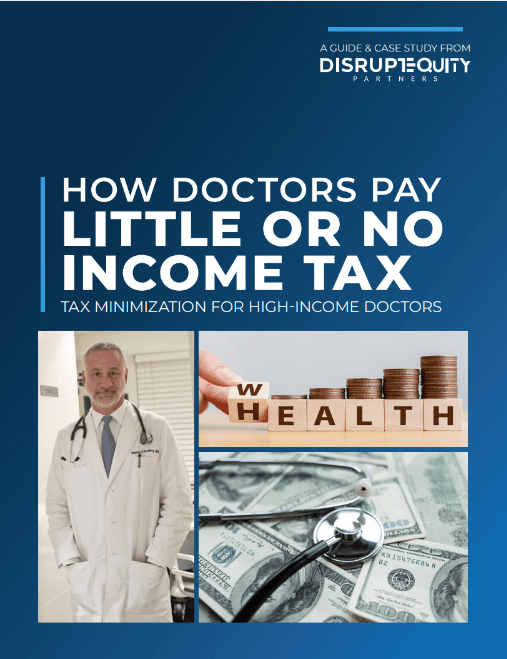As a high-earning doctor, you’re likely familiar with substantial tax bills. But have you considered the tax-lowering potential of real estate investments? More than just diversifying your portfolio, real estate can offer significant tax advantages, effectively reducing your annual tax obligations. Want to learn more? The following article explains everything you need to know about using real estate to reduce your tax burden.
The Power of Passive Real Estate Investments for Doctors
Passive real estate investing offers a valuable avenue for reducing tax obligations, presenting an attractive option for those looking to diversify their investment portfolio. By channeling funds into real estate syndications or investment funds, investors gain the perks of property ownership without the day-to-day responsibilities that typically accompany it. But how exactly does this mechanism operate to the investor’s advantage?
These types of investments are structured in a way that allows investors to claim depreciation on their properties. Depreciation is a tax deduction that reflects the costs of wear and tear on the property over time, even if the property is increasing in value. This can significantly reduce the taxable income an investor reports, leading to considerable tax savings.
Moreover, passive real estate investments aren’t just about tax benefits. They also offer a consistent income stream through rental earnings. Tenants pay rent monthly, and the profits are distributed to investors after expenses are covered. This can provide a reliable source of passive income, which is especially appealing for those seeking to build wealth without actively managing properties.
In addition to generating rental income, these investments hold the potential for long-term appreciation. As property values increase over time, so does the potential for a substantial return on investment upon selling the property or properties involved in the fund or syndication. This dual benefit of ongoing income and appreciation potential makes passive real estate investing an attractive strategy for building wealth and reducing taxable income simultaneously.
Engaging in real estate actively can transform your tax situation. Depreciation, for instance, is a non-cash deduction that reflects the theoretical decline in value of your real estate investment over time. It serves as a powerful tool for reducing your taxes. As a high-earning doctor, you can significantly reduce your tax burden through active investment in real estate. This strategy involves more than merely supplying capital for investment purposes; it entails your direct involvement in the management or decision-making processes related to the property. By engaging actively, you position yourself to leverage various tax deductions and benefits.
One of the most notable advantages is the ability to claim depreciation on the property, which acts as a non-cash deduction and reduces your overall taxable income. Additionally, other operational expenses, such as maintenance, repairs, and property management fees, can also be written off against your income.
By strategically navigating these tax incentives, you can mitigate the impact of annual tax bills, thereby retaining more of your hard-earned income. This approach requires a keen understanding of real estate investment and tax laws, making it essential to consult with financial and legal advisors specializing in real estate investments. Ultimately, this proactive involvement in real estate can be a game-changer for high-earning doctors seeking to optimize their financial portfolios and reduce their tax liabilities.
Leveraging Real Estate Professional Status (REPS) for Tax Benefits
Another effective strategy is qualifying for Real Estate Professional Status (REPS) with the IRS. This status allows you to deduct real estate losses from your taxable income, offering a substantial tax shield. However, qualifying for REPS involves dedicating a significant amount of time to real estate activities, potentially through a non-working or part-time working spouse. This status can be especially beneficial if most of your income comes from your medical practice, as it allows for large deductions that are usually restricted for high-income earners.
Diversifying Investments for Financial Stability and Tax Efficiency
Diversifying your investment portfolio by including real estate can provide financial stability and tax efficiency. The key here is that real estate investments are generally not correlated with the stock market, offering a hedge against market volatility. This diversification is not only beneficial for your overall financial health but also offers various tax advantages, such as different depreciation schedules and the potential for deferring capital gains through mechanisms like 1031 exchanges.
Building Generational Wealth with Tax-Efficient Real Estate Strategies
Finally, investing in real estate also presents the opportunity to build and pass on generational wealth in a tax-efficient manner. Here, strategies like 1031 exchanges allow you to defer taxes on real estate gains while growing your portfolio. Furthermore, upon inheriting, your heirs can benefit from a step-up in basis, potentially erasing the tax burden on the property’s appreciated value.
Wrapping Up
Ultimately, the main point is that for doctors facing substantial tax burdens, now is the time to consider real estate investing. This approach not only helps to alleviate hefty tax bills but also opens up pathways for financial diversification and growth. So, think of it as your personal invitation to explore what real estate can do for your financial portfolio. Who knows? It could be a smart move that changes your financial well-being and secures your path to generational wealth!

Read the White Paper (click image)
Are you a high income earner? Find out how Doctors Pay Little to No Income Tax! If you're a high income earner, chances are you've been hit hard by income taxes. As your salary increases, so does the amount of money being taken out of your pocket in taxes. This can often feel frustrating and unfair. But what if we told you that there was a way for high income earners to legally pay little to no income tax? That's right, it is possible! And it's not just for doctors, although they are one of the professions that can benefit greatly from this strategy. The key lies in understanding the tax code and taking advantage of certain deductions associated with real estate investing.